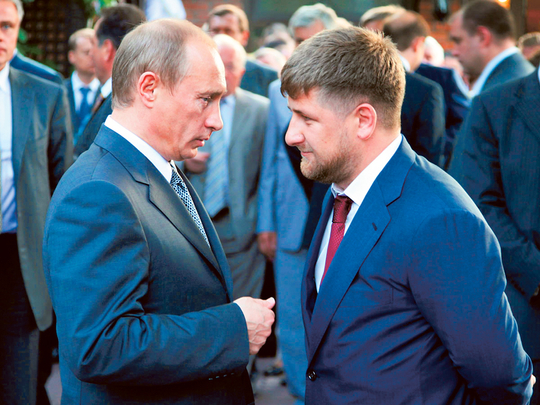
Chechnya’s macho leader Ramzan Kadyrov is the most loyal of Vladimir Putin’s regional heads, at least in theory. Grozny’s central street is called Putin Avenue, and the lampposts lining it are adorned with the Russian tricolour. Putin’s portrait looks down from dozens of buildings across the city, and Kadyrov’s Instagram account, his main method of communication with the outside world, is full of protestations that he is a “foot soldier”, supremely loyal to Russia’s great leader.
But recent events, especially the murder of Boris Nemtsov in Moscow, have led to renewed debate over whether the Kremlin’s political control over the region, won back after two gruesome wars in the post-Soviet years, may be loosening.
While pledging a feudal-like loyalty to Moscow, Kadyrov has been provided billions of roubles to rebuild Grozny, which has been transformed from a ruined shell reminiscent of Stalingrad to a modern city studded with shiny Dubai-style skyscrapers. Wealthy locals dine in the 32nd-floor restaurant at Grozny City, a five-star hotel, the football team plays at a newly renovated stadium.
But Kadyrov has also built up his own private armies. In an extraordinary address to thousands of his troops, gathered in fatigues and armed in Grozny’s main stadium in December last year, a black-shirted Kadyrov said his men were ready to fight for the motherland at any time.
“America and Europe have declared an economic war on Russia,” he declared to the assembled ranks of fighters. “But the Russian people have rallied around their leader Vladimir Putin ... Long live our great motherland Russia! Long live our national leader Vladimir Putin! Allahu Akbar!”
The pictures were not widely broadcast on Russian television, and the sight of a regional leader commanding such a fierce army gave many pause for thought. “One theory is that this was a genuine show of loyalty to Putin, while another theory is that it was actually a warning, showing everyone that Chechen forces have this extraordinary potential. Of course, it’s quite likely that both of these theories are true,” said Grigory Shvedov, editor-in-chief of Caucasian Knot, one of the only independent news sites specialising in Russia’s North Caucasus region.
Kadyrov’s forces have long had a dubious reputation. For many years, rights activists and analysts have worried that the rebuilding of Chechnya has come at a huge price, both in terms of money and in terms of turning a blind eye to human rights abuses committed by Kadyrov’s battalions and special units.
Earlier in June, one of the last human rights groups in the republic said a large mob of people had gathered outside its office, smashing windows and destroying its car, apparently accusing it of fighting an “information war” against Chechnya for documenting rights abuses. The group already had its offices in Grozny burnt down in December.
This kind of attack on rights groups or freedom of speech has long been considered the price Moscow has to pay for keeping Chechnya under its formal control. But the assassination of Nemtsov, in the shadow of the Kremlin, has led many to wonder whether Chechnya has slipped too far out of Moscow’s orbit.
Investigators arrested several Chechens in connection with Nemtsov’s murder, including a deputy commander of one of Kadyrov’s special battalions. Russian agencies reported that one of the main suspects, Ruslan Geremeyev, who is close to Kadyrov, was being guarded in a Chechen village and was later helped to flee the country. Kadyrov wrote on his Instagram account that Zaur Dadayev, one of the arrested men, is “a true patriot of Russia”.
In recent days, there have been reports that investigators have a video of Dadayev saying goodbye to Geremeyev at the airport in Moscow in the days after the killing. The trail appeared to lead directly to the Chechen leader.
Joining the dots between the investigators’ leaks in the press and Kadyrov’s Instagram belligerence, many analysts have speculated there is a battle going on between different parts of Putin’s security services: those who want to take Kadyrov down, and those who believe he must be protected at all costs to stop Chechnya sliding into chaos.
A former Kremlin insider told “The Guardian” earlier this year that “nobody in Moscow has ever liked Kadyrov” because no state bodies work normally in Chechnya: not the police, prosecutors office or courts. A source in Grozny confirmed that almost everyone in a position of power in the republic is locally appointed, with just a few people in the FSB security service coming from Moscow.
Ten days after Nemtsov’s murder, as the Russian media was full of speculation linking those close to Kadyrov to the hit, the Kremlin announced Kadyrov would receive the Order of Honour, a top state award. It was read by many as a sign that the Chechen leader is untouchable. Lawyers for Nemtsov’s family want Kadyrov himself questioned over the killing, but that appears unlikely.
Some play down the idea of a feud between the FSB and Kadyrov, and point out instead the usefulness of the Chechen leader. Andrei Soldatov, a specialist on the Russian security services, said he believes talk of a full-blown feud is exaggerated. The FSB needs Kadyrov, he believes: “Links with Western security services are important for the FSB leadership and the main thing Russia has to share is information on people going to Syria to fight. The main source of this information is Kadyrov.”
Others say that while Kadyrov may have become more unruly, the Kremlin’s new antagonism with the West makes him more important than ever. “With the events in Ukraine and the changing political climate, I think there has been a much greater need for Ramzan over the last year,” said Shvedov. “Kadyrov is a unique politician on the Russian scene. What other local leader could rail at the West in the same way he does, or personally insult Obama? They would be too worried about their houses in California and so on, but Kadyrov can and does speak his mind freely.”
But the tension has at times spilled out into the public domain, an extremely rare occurrence in Putin’s “power vertical”. Kadyrov reacted furiously to a “special operation” carried out in Grozny by special police troops from nearby Stavropol region, which led to the wanted man being shot dead. Kadyrov ordered Chechen law enforcement that they should “shoot to kill” any police officers from other regions who came to Chechnya without informing local authorities first.
The Interior Ministry in Moscow reacted with a statement that the outburst was unacceptable, and Kadyrov’s words quickly disappeared from local television broadcasts. Later, the Chechen leader said he had been misinterpreted.
Last month, exiled oligarch Mikhail Khodorkovsky’s Open Russia foundation released a film about Kadyrov’s Chechnya. “Russia’s policies in Chechnya will lead to the creation of two dangerous enemies — Ramzan Kadyrov’s clan and the people of Chechnya. Sooner or later, one or the other of them will start a war with us,” wrote Khodorkovsky in an accompanying article.
Kadyrov’s response, as usual, came on Instagram. With the somewhat sinister title “If you haven’t understood by now, you soon will”. The supposed “trailer” for the “film” featured Kadyrov running across a plain, weapon in hand. He wrote it was directed by a Hollywood star and featured “international A-list stars”. Given there is almost certainly no Hollywood film, it felt like a threat.
“Kadyrov has done everything to rebuild the republic, everything is thanks to him,” said a former member of one of Kadyrov’s militias in an interview in Grozny. “But if you’ve read anything of Caucasus history, you’ll know this is unlikely to be the end. We can never trust Russia, and there is sure to be more trouble in the future.”
Another contentious incident was the marriage of a 17-year-old schoolgirl to a middle-aged police chief who already had a wife. Kadyrov intervened after human rights activists criticised the marriage, and the chief of his administration personally brought the bride to the registry office. In the days after the marriage, Kadyrov gathered a group of locals who had “spread rumours” about the marriage. It was not made clear how they were identified.
He blamed gossiping women for spreading rumours about the marriage using WhatsApp and called on men to ensure their female family members did not spend time using the app. “Lock them in, do not let them go out, then they will not post anything,” he said, according to translation from Chechen language by Russian media. “Family honour is the most important thing. Do not write such things. Men, take your women out of WhatsApp.”
Some say allowing Kadyrov so much breathing space risks provoking the very war Russia is so keen to prevent. “It turns out the price for Russia of ‘peace’ in the Caucasus is the de facto semi-independence of Chechnya, which our regime has to accept because it can’t keep ‘constitutional order’ in the Caucasus without Kadyrov and his personal army,” wrote Gennady Gudkov, an opposition politician former KGB officer who sat on the Duma’s security committee until recently, in a column.
“Of course we can just pretend that Chechnya is a part of Russia just like Yaroslavl, Sakhalin or Petersburg. That’s what we did at the end of the 1980s when the USSR’s laws stopped working in this proud Caucasus republic. And we know what happened then. Are we risking a repeat?”
Some Chechens express love for Kadyrov and say a place such as Chechnya can only be governed with strong rule. Even for many Chechens who are uneasy about Kadyrov’s role, the memories of a decade living amid war and chaos are still fresh, and most people say they are willing to put up with a lot to avoid war.
Many locals say Russian criticism of Chechnya’s existence outside Russia’s legal system is unfair. Polygamy is fairly widespread in Chechnya, explained partly by local traditions and partly by a shortage of menfolk after all the tragedies the Chechens have experienced in recent decades.
“The Quran gives men the right to have up to four wives,” said Murad, the eldest of 25 children that his now-deceased father had with three separate wives. “What man wouldn’t want several wives? It’s never been a problem here. In Russia they do the same thing, it’s just there they call it having a mistress. Here it’s official and honest.”
At a wake in Grozny, held for a well-known Soviet-era wrestling trainer who had just passed away, the smell of sweat wafted through the air as the men performed the “zikr”, a Sufi-inspired local tradition of prayer and swirling dance, while the headscarved women prepared hunks of meat and a giant vat of soup. The scene felt far removed from Moscow. But there was bemusement among the guests over the idea that by operating according to Sharia rather than the Russian constitution, Chechnya was somehow more lawless than the rest of Russia.
“There they ignore the law and here we ignore the law. It’s just that there it’s based on wealth and corruption, and here it comes from Allah,” said one.
–Guardian News & Media Ltd












